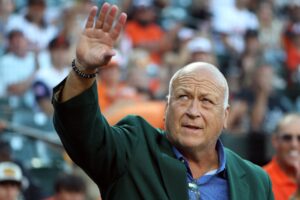
It’s almost hard to believe that 30 years have passed since Cal Ripken ran down the Iron Horse and became baseball’s all-time symbol of durability and determination by breaking a record that few imagined would ever be challenged, much less shattered.
Yet Ripken, who will be honored Saturday on the anniversary of that great night when he eclipsed Yankee legend Lou Gehrig’s string of 2,130 games in 1995, said on Friday that he’s not so sure that the record he set 501 more times over the next three years will never be broken.
“I still think somebody else can do it,’’ he said during a dugout session with the media before the opener of a three-game series between the Orioles and Los Angeles Dodgers. “I would love that because I think there’s a principle of going out and playing, and I think that would bring tribute to the game.”
Pardon my first-person intrusion here, but I was there for a pretty big chunk of the streak and I always believed he would break the record unless some black swan swooped down and carried him onto the injured list. He was just built for it – a big, strong uber-determined unicorn of a shortstop who could take a hard slide and help the woozy baserunner up.
But on the issue of someone actually making a run at 2,632 games, we part company. Not only is no one ever going to make a real run at it, no one will be allowed to try.
We live in a much different baseball world than we did when Ripken was in his prime. We live in a world where a couple of guys have contracts worth more than $700 million and big-name players are managed to optimize those giant investments, not joust one of the game’s biggest statistical windmills. It’s also a world where pitchers are considered iron men if they pitch six innings 10 starts in a row.
Ripken always insisted that he played because that was how he was brought up. Grab that lunch pail or infield glove and be at work on time … every day, not just when you feel like it.
It’s not that there aren’t any players physically able to do it. Braves first baseman Matt Olson will play in his 761st straight game Friday night, which is very admirable. He’s 31, so he’d only have to play every game for the next 12 years to challenge the Iron Oriole.
Throw in the fact that most teams are managed both by controlling field managers and analytics-obsessed front office executives whose jobs depend on not just optimizing, but protecting their most valuable players from risky overuse.
So Cal will have to forever bear the burden of the physical miracle that he performed from 1982 to 1998, even though it sometimes obscures the fact that he was an astonishingly accomplished player who would have been a first-ballot, 98-percenter when he became eligible for induction in the National Baseball Hall of Fame if had insisted on getting every Sunday off.
“I don’t look at it that way,’’ he said. “Some people say, ‘Do you think it’s fair that you’re remembered [mostly] for the streak. I think I answered that in front of some of you 30 years ago, if you’re remembered at all, that’s pretty good. Your career is what it is. I don’t worry about how it’s judged.”
Everyone’s best memory of that night was the uplifting victory lap that Cal took around the warning track at Oriole Park, high-fiving and shaking fans’ hands to an ovation that seemed like it would never end. The best headline on the front page of the Baltimore Sun read, “Cal Touches Home,” and it was perfect, though Ripken initially balked at the idea.
“When Bo [Bobby Bonilla] and Raffy [Rafael Palmeiro] pushed me out of the dugout, I really didn’t want to do that. But they kept saying, ‘We won’t get this game started,’ and I was super sensitive to that because it would be like a long rain delay and you’d lose your place,” Ripken said. “I thought the game was important and we should finish the game and celebrate afterwards.
“Then once they gave me that final shove and I got about 100 feet down the line, I could have cared less about the game starting again. It was that good of an experience.”
